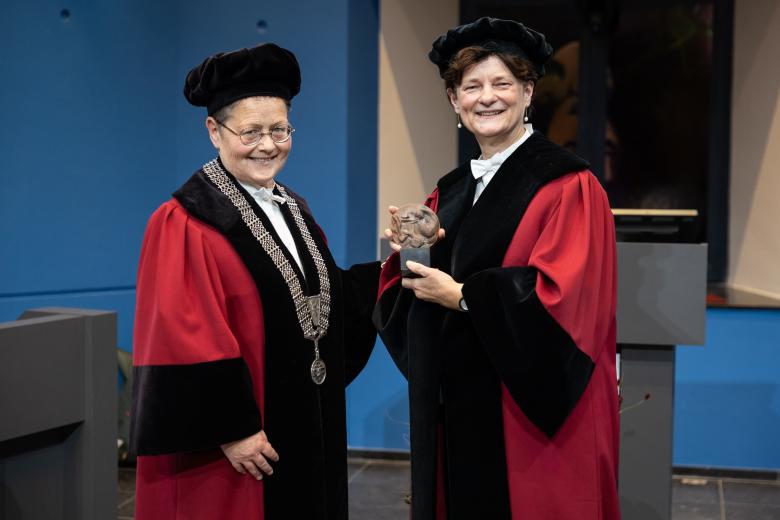Government commissioner Mariette Hamer discusses sexual safety
Government Commissioner Mariette Hamer, responsible for addressing issues related to sexual misconduct and sexual violence, participated in a discussion with students and staff at Maastricht University on Friday, 15 September. Joining her were Executive Board President Rianne Letschert and Joyce Grul, the programme manager for Sexual Safety at UM. The discussion was moderated by Constance Sommerey, UM's Diversity Officer.
The meeting was partly interactive, with students and staff able to respond to a number of statements that were mainly meant to start the conversation. For instance, one statement was, "The university bears full responsibility for ensuring sexual safety within the UM community." The responses shed light on what students and staff deem important, their needs, and the support the university can provide.
Structural, cultural problem
Hamer highlighted the significant societal challenge associated with this issue: it entails addressing and transforming a deeply ingrained culture that has persisted across generations. It's a culture characterised by tolerance, turning a blind eye, and hesitating to confront sexually inappropriate behavior and sexual violence. This culture has been pervasive, and it's imperative that we start and sustain dialogues to address and change it, according to the government commissioner.
We’re all at a pioneering stage. Also at UM, where students and staff have put the topic firmly on the agenda in recent years. The Sexual Safety programme is only a beginning and the agenda will be fleshed out in the coming years.
Sensitive topic
The subject is very sensitive, as the conversation with Mariëtte Hamer showed. Talking about it can even lead to uncertainty among people: 'what can I actually say nowadays? Conclusion: To prevent groups from disengaging from discussions, it's essential that this uncertainty is welcomed and addressed within a secure environment. Because that is essential: we need to keep having the conversation about this.
Equally important: reporting sexually transgressive behaviour. Only then can undesirable behaviour or behavioural patterns become visible and action be taken. The way reports are handled is decisive: it must be crystal clear that the organisation stands behind the person who reports this behaviour. And above all, programme manager Joyce Grul stressed: "It is really up to you whether you report it or not. Everyone must be able to count on reports being safe, on it being clear what you can expect from the organisation after a report is made, and on the organisation where you make the report standing behind you. That is a prerequisite, but even if it is met: it remains up to you to decide to report or not.'
Viewing tip from Mariette Hamer: the Dutch documentary Belaagd. According to the government commisioner, it offers insight and gives viewers a reality check. In Belaagd, a large number of Dutch women, young and old, talk about misplaced jokes, groping, sexual assault, sexual harassment, rape and other sexual violence.
Clear procedures
Finally, there is a great need for clear reporting and complaint procedures. It would help if codes of conduct were findable, clear and unambiguous. And if such codes show that transgressive behaviour is unacceptable and dealt with. This was the consensus among the participants in the discussion. Executive Board President Rianne Letschert added that, at UM, the various documents are being structured more and are becoming more findable. At the same time, she emphasised that these formal, 'paper' agreements are not a panacea in what she described as a necessary cultural change.
The follow-up
All in all, it is clear that there remains a lot to discuss, and Maastricht University will continue its efforts to develop effective approaches. Its Sexual Safety programme will be further expanded to provide effective training and support to the various target groups. This will include a focus on (alleged) perpetrators, in addition to providing clear information and support to victims/survivors.
Also read
-
Green school playgrounds boost concentration and wellbeing
Children at schools with green playgrounds are better able to concentrate and display more social behaviour. This is the conclusion of a follow-up study within the long-running project The Healthy Primary School of the Future .
-
Ron Heeren appointed fellow of the Netherlands Academy of Engineering
Professor Ron Heeren, distinguished university professor at Maastricht University (UM) and director of the Maastricht MultiModal Molecular Imaging Institute (M4i), was appointed as a fellow of the Netherlands Academy of Engineering (NAE) on Thursday 11 December.
-
Prof. dr. Mirjam oude Egbrink awarded MUMC+-medal
During her farewell lecture on Friday, 28 November, Prof. Mirjam Oude Egbrink was awarded the MUMC+ medal by Dean Annemie Schols for her distinguished career.